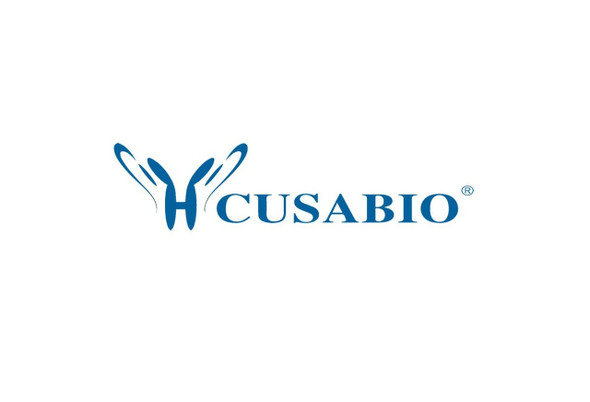Cusabio Human Recombinants
Recombinant Human 26S proteasome non-ATPase regulatory subunit 10 (PSMD10) | CSB-EP018899HU
- SKU:
- CSB-EP018899HU
- Availability:
- 13 - 23 Working Days
Description
Recombinant Human 26S proteasome non-ATPase regulatory subunit 10 (PSMD10) | CSB-EP018899HU | Cusabio
Alternative Name(s): 26S proteasome regulatory subunit p28Gankyrinp28(GANK)
Gene Names: PSMD10
Research Areas: Cancer
Organism: Homo sapiens (Human)
AA Sequence: MEGCVSNLMVCNLAYSGKLEELKESILADKSLATRTDQDSRTALHWACSAGHTEIVEFLLQLGVPVNDKDDAGWSPLHIAASAGRDEIVKALLGKGAQVNAVNQNGCTPLHYAASKNRHEIAVMLLEGGANPDAKDHYEATAMHRAAAKGNLKMIHILLYYKASTNIQDTEGNTPLHLACDEERVEEAKLLVSQGASIYIENKEEKTPLQVAKGGLGLILKRMVEG
Source: E.coli
Tag Info: N-terminal 6xHis-SUMO-tagged
Expression Region: 1-226aa
Sequence Info: Full Length
MW: 40.4 kDa
Purity: Greater than 90% as determined by SDS-PAGE.
Relevance: Acts as a chaperone during the assbly of the 26S proteasome, specifically of the PA700/19S regulatory complex (RC). In the initial step of the base subcomplex assbly is part of an intermediate PSMD10:PSMC4:PSMC5:PAAF1 module which probably assbles with a PSMD5:PSMC2:PSMC1:PSMD2 module. Independently of the proteasome, regulates EGF-induced AKT activation through inhibition of the RHOA/ROCK/PTEN pahway, leading to prolonged AKT activation. Plays an important role in RAS-induced tumorigenesis.Acts as an proto-oncoprotein by being involved in negative regulation of tumor suppressors RB1 and p53/TP53. Overexpression is leading to phosphorylation of RB1 and proteasomal degradation of RB1. Regulates CDK4-mediated phosphorylation of RB1 by competing with CDKN2A for binding with CDK4. Facilitates binding of MDM2 to p53/TP53 and the mono- and polyubiquitination of p53/TP53 by MDM2 suggesting a function in targeting the TP53:MDM2 complex to the 26S proteasome. Involved in p53-independent apoptosis. Involved in regulation of NF-kappa-B by retaining it in the cytoplasm. Binds to the NF-kappa-B component RELA and accelerates its XPO1/CRM1-mediated nuclear export.
Reference: "Initial characterization of the human central proteome."Burkard T.R., Planyavsky M., Kaupe I., Breitwieser F.P., Buerckstuemmer T., Bennett K.L., Superti-Furga G., Colinge J.BMC Syst. Biol. 5:17-17(2011)
Storage: The shelf life is related to many factors, storage state, buffer ingredients, storage temperature and the stability of the protein itself. Generally, the shelf life of liquid form is 6 months at -20?/-80?. The shelf life of lyophilized form is 12 months at -20?/-80?.
Notes: Repeated freezing and thawing is not recommended. Store working aliquots at 4? for up to one week.
Function: Acts as a chaperone during the assembly of the 26S proteasome, specifically of the PA700/19S regulatory complex (RC). In the initial step of the base subcomplex assembly is part of an intermediate PSMD10
Involvement in disease:
Subcellular Location: Cytoplasm, Nucleus
Protein Families:
Tissue Specificity: Tends to be up-regulated in cancer cells with RAS mutations, including lung cancers and adenocarconimas (at protein level).
Paythway:
Form: Liquid or Lyophilized powder
Buffer: If the delivery form is liquid, the default storage buffer is Tris/PBS-based buffer, 5%-50% glycerol. If the delivery form is lyophilized powder, the buffer before lyophilization is Tris/PBS-based buffer, 6% Trehalose, pH 8.0.
Reconstitution: We recommend that this vial be briefly centrifuged prior to opening to bring the contents to the bottom. Please reconstitute protein in deionized sterile water to a concentration of 0.1-1.0 mg/mL.We recommend to add 5-50% of glycerol (final concentration) and aliquot for long-term storage at -20?/-80?. Our default final concentration of glycerol is 50%. Customers could use it as reference.
Uniprot ID: O75832
HGNC Database Link: HGNC
UniGene Database Link: UniGene
KEGG Database Link: KEGG
STRING Database Link: STRING
OMIM Database Link: OMIM









